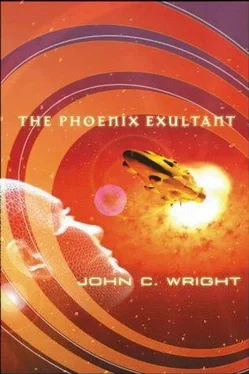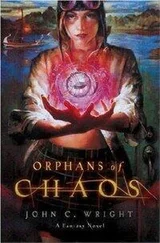The nanomachinery in his suit had been damaged, of course. But Phaethon had not realized that part of the damage had affected the suit's internal damage-control and safety routines.
One of the Afloats had erased the safety interlocks from the oversight routine in order to allow him to reprogram a stolen scrap of the suit to make nitrous oxide, not oxygen, through its recycler. When that section had rejoined the main suit, some error in the reproducer had carried the erase-command over into the maintenance routine. Thus, every time Phaethon's lungs pumped carbon dioxide into the suit's faceplate, the erroneous command broke up the carbon dioxide and made nitrous oxide.
The broken safety checker knew enough not to pass the laughing gas back to Phaethon, but did not know enough either to dispose of it or to call it to Phaethon's attention. Instead, the broken safety checker shunted the nitrous oxide into the little storage pockets meant for the stacked oxygen molecules, and dumped the oxygen.
The suit contained little packages or bubbles of iso-molecular raw materials, like tiny storehouses of gold and carbon, frozen oxynitrogen or hydrogen chains for the other mechanisms in the suit to combine and manipulate. These pockets were designed only to hold racks and rows of molecules at a standardized orientation and spin; otherwise, the suit mechanisms could not grasp and manipulate them. The nitrous oxide, flooding the pockets, was, of course, not at the correct temperature, orientation, or composition. This had damaged most of the manipulator elements in the suit. Normally, it would have been child's play to draw oxygen out of the H2O molecules of the water around him, but now all the pores he would have used to separate out the oxygen were jammed. It would take at least an hour to repair the damage; Phaethon doubted that he could hold his breath that long.
Even if he abandoned the armor, his space-adapted body was not buoyant, and he could not float to the surface. He might be able to survive the buildup of nitrogen in his blood; special osmotic layers in his veins, another space adaptation, could screen out most nitrogen buildup. Could he simply swim up by brute strength alone? He was not sure how far overhead the surface was. And how could he find his armor again if he simply left it on the sea bottom?
One moment of supreme self-loathing and self-pity stabbed through him. Why had he not carefully checked every element, every command line of his armor when he had recovered it? His armor on which his life depended? Why? Because he had been raised as a pampered aristocrat, with a hundred machines to do all his bidding for him, to think his thoughts and anticipate his whims, so that he had lost the basic survival skills of discipline, foresight, and thoroughness.
Choking on bile, Phaethon thought the escape command, and panels of his armor fell away. Black seawater closed in on his face, blinding him. The black nanomachine lining swelled up, forming pockets of hydrogen along the chest and arms, trying to add buoyancy.
His armor, his beautiful armor, which had meant so much to him an hour ago, sank down swiftly and was gone.
He kicked away from the bottom, swung his arms and legs, and tried to pull his heavy body upward.
Upward. Icy water sucked the heat from his body in a moment. His limbs moved more slowly.
Upward. His struggles grew more wild. He lost his sense of direction.
Upward. He encountered some sort of kelp or seaweed, which tangled around his flailing arms, wrapped his legs with soft embrace.
Upward. It was the direction the stars were in. Phaethon did not know where they were. He was disoriented. He had lost the stars.
What were those little lights approaching him? Were they fairy lamps, come to greet him in his hour of victory? Or were they the metallic flashes in the eyes of a dying man about to faint?
Then there was nothing.
Little Spirit, why are you alive?"
Words, like something from myth, or dream, floated up. Sorrow, great sorrow, to be his fate, and deeds of renown without peer... to little men, the height is too great; to him, the stars are near...
"Daphne. Daphne said ..." He heard his own voice, muttering gibberish. Did he speak aloud? The words on his memory casket had come from the epic Daphne once composed in his honor ... back before he sank and drowned ...
"Then is she that one for whom you live, little one?"
Phaethon jerked open his eyes. A blur of green, dimness, shadows. He saw nothing.
His body jerked. He was numb, floating, drifting. Some sort of vines or swarms of living eels entwined his limbs with soft firmness; he could not move.
"Do not struggle, little one, unless to damage yourself is your goal. We have formed a pocket of your air; our dolphins rise to the surface, draw breath, and descend to breathe into your pocket here."
He attempted speech again. This time, his voice was clear. "Whom do I have the honor of addressing?"
"Aha. Polite little one, isn't he? We are Old-Woman-of-the-Sea."
The words were coming directly into his thoughtspace, over his suit-lining channel. Some sort of tube or medical appliance was thrust in his mouth. Other vines felt as if they held pads to his skin. Needles pierced his arm. The black nanomachinery of his lining was in motion; it was forming and unforming chemicals and combinations. He could feel the pulse of heat burning through it. The sensation comforted him.
Phaethon's eyes rolled back and forth. He saw nothing, at first. Then he detected a slide of gray shadow to his left and right. Two dolphins came near. He heard a rush of bubbles, a high-pitched squeak of dolphin sound. Air bubbled into the little space around his head.
"Madame, I thank you, and the gratitude I have is without limit. And yet I must warn you that those who assist me may fall under the ban of the College of Hortators."
"Our dolphins act by their own nature, and it is their nature to assist those in need. Had there been sharks nearby, the parts of our mind may have reacted differently. Such is life."
(Why did it sound so much like the voice of his mother, Galatea, whom he recalled from his far-vanished youth? Perhaps it was merely how regal, how queenly, how very much in command the voice rang ...)
"Ah. Forgive me, Madame, but, nonetheless, you yourself may be held to account for your generosity to me."
"The little one is noble as well! You seek to shield us from harm? Us?" There was a hint of vast laughter in the voice.
"The College of Hortators wields wide influence!"
"Yet we are as wide as the sea. Part of us are in the kelp, the coral, and the dust of the seabed, measuring, moving, releasing heat, storing it. Part of us is woven into the thoughts of fish and sea-beast, moving from brain to brain with the swiftness of a radio flash, or slowly, over centuries, thoughts encoded into chemicals drifting in the sea tides. After centuries or seconds, our thoughts come together again in new forms, drops that rise as dew above the gentle tropics, or move through storms that ring the arctic.
"We breathe to calm the hurricanes; we blush to stir the trade winds into life. We sway the Gulf Streams, we thrust the currents and the counter-current of the tide as if they were limbs a hundred miles wide, and yet we count each plankton cell which feeds your world's air. Predator and prey move through us like corpuscles of arteries and veins, governed by the stirring of a mighty heart. Parts of us are older than any other living being, older than all other Cerebellines, older than all Compositions save for one. You cannot imagine what we are, dear little one; how, then, could you imagine we could fear your Hortators? We know nothing of your land-world; we care nothing for your Hortators. There is only one man of all your Earth whose name we know; one man whose fate fascinates our far-ranging and ancient thoughts."
Читать дальше











